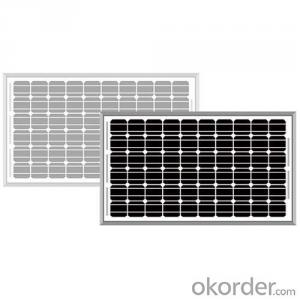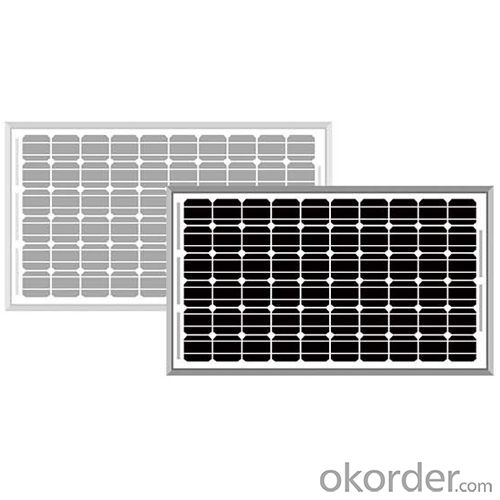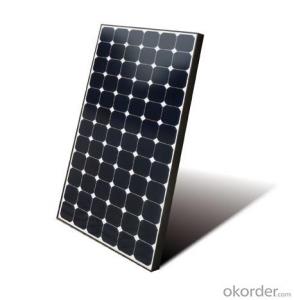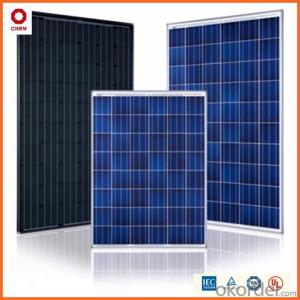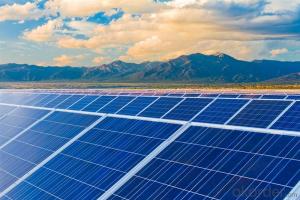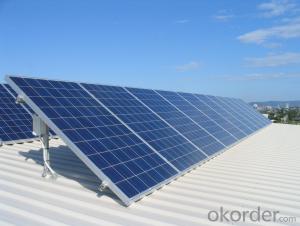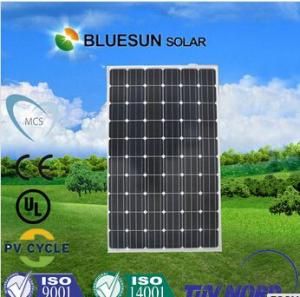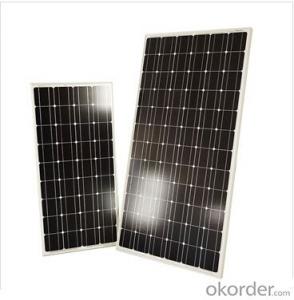Top Tier Mono-Crystalline Solar Panel 245W
- Loading Port:
- China Main Port
- Payment Terms:
- TT OR LC
- Min Order Qty:
- -
- Supply Capability:
- -
OKorder Service Pledge
Quality Product, Order Online Tracking, Timely Delivery
OKorder Financial Service
Credit Rating, Credit Services, Credit Purchasing
You Might Also Like
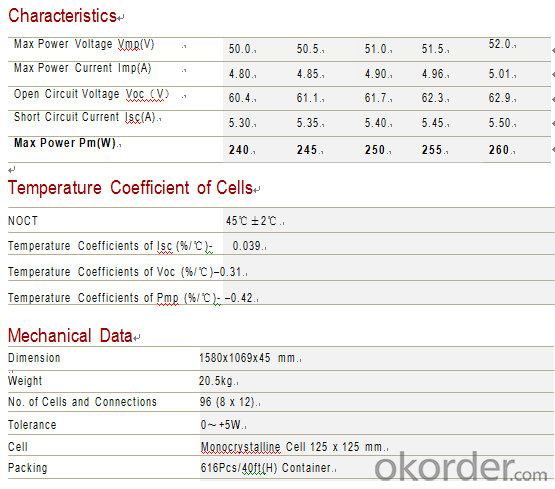
High efficiency silicon based solar cells and modules,which are individually characterized and electronically matched before interconnection and laminated with toughened glass,EVA and TPT of high quality. Through strict selection of raw materials, stringent quality control and rigorous test. Our pv mdoule have always committed to higher efficiency, more stable and better cost performance products. Our pv module is no less than 90% within 10yrs and no less than 80% within 25yrs
- Q: Well I was thinking about the idea of renovating either a smaller school bus or building a tiny house and I was wondering if i can get some information on the size and watts panel should I use or more like how to get that whole solar energy in motion. Any infor and links would help
- I think that typical solar panels are 2'x4' and produce something like 800-000 wh per day. (That's 0.8 - kwh per day.) More in the summer, less in the winter, if they're aimed sort of at the sun. There are newer, more expensive panels that produce more. There are also thin film panels that are less expensive, and probably more sturdy. You then have a couple choices. In a house, you'd have an expensive inverter to connect to the utility power, so you can have power at night when your panels aren't generating anything. In a trailer, you want 2-4-6 deep cycle car batteries to store the power. Then you could have an inverter to convert that power to 20v AC, so you could use normal appliances. Or, you could buy appliances that run on 2 volts DC. Maybe a combination of both. You'll need to figure out how much power you're going to use, so you know how many panels and batteries you're going to need. The calculation is easy. Figuring out how much power you need is hard. You need deep cycle batteries because you can repeatedly charge them way up and run them way down. Ordinary batteries die fairly quickly when you do that.
- Q: What does it take to install the solar panel? Cable wires to power source or fuse box? Anything else?How does the cable wires stay on the solar panel?
- How does the cable wires stay on the solar panel? With wire retention clips (4 per module) that are used to wrap the wire on the underside of the module frame. The home run cables to the transition box (converts between types of wire with no electrical transformation occuring) or combiner box (joins multiple source circuits in parallel, with the positives fused for safety) are usually tied along the racking system components, and with conduit sections used as needed. Racking is another big part of the installation. Don't just make your own homemade wooden rack, as these will weather away to nothing very easily, and cause great failures. GET a professionally designed metal racking system. PV modules are EXPENSIVE. Don't let the racking system cause them to break. It also requires the inverter, if you intend it to connect to the main electric service. If using multiple inverters, you need an AC combining panelboard to join them prior to entering the main electric service. Otherwise, you need to think about how else you might be using them. If you are charging batteries, you need a charge controller.
- Q: Can solar panels be used in areas with high levels of hurricanes?
- Yes, solar panels can be used in areas with high levels of hurricanes. However, it is important to ensure that the solar panels are designed and installed to withstand strong winds and other extreme weather conditions. Proper mounting and anchoring techniques, along with robust construction materials, can increase the resilience of solar panels against hurricanes. Additionally, regular inspections and maintenance are necessary to ensure their functionality and safety in such areas.
- Q: How do solar panels affect the property's energy resilience?
- Solar panels can significantly enhance a property's energy resilience by providing a reliable and sustainable source of electricity. They reduce dependence on the grid, allowing homeowners to generate their own power and potentially store excess energy in batteries. In the event of a power outage or grid failure, solar panels can continue to supply electricity, ensuring uninterrupted energy supply and boosting the property's overall energy resilience.
- Q: Maximum size of solar panel i have to use is - 8 * 5 feet - this is the limitation given to us.
- Just buy solar panel has output rated 500 watt.
- Q: Could you throw some long scientific words in with your answer so I can impress my teacher, I'm looking to expand my scientific vocab. Thanks
- Solar panels are a generic term for any type of solar collecting panel. There are two major types: Photovoltaic uses substances that turn the incoming radiation directly into electricity. Usually you have to have direct sunlight (no clouds) for this to work well. Solar thermal is also used in a lot of areas. Here the radiation is used to heat a circulating fluid (often water directly), and then that is either used directly, or it's used for heat exchange with a heat pump or a boiler system. Solar thermal can collect significant heat even on a cloudy day. So a solar panel could be made of photovoltaic panels, but it doesn't have to be.
- Q: I'm trying to charge rechargeable AA batteries with a solar panel. What gauge wire should I use to connect the panel to the batteries? I know I'm not going to have a lot of current going through so the wire size doesn't really matter. Can the wire be too thick thoShould I ugh? Should I use a diode to keep the batteries from overpowering the circuit? If so, what size diode? My panel is 4.8V 50mA. Can I just hook the panel straight into the batteries or do I need something else?
- In order: .? Just about any wire will do.? You can handle 50 mA over just about anything, even 28 gauge telephone wire.? Your biggest problems are probably going to be mechanical stress (you want stranded wire instead of solid, to avoid breakage) and dealing with the size of larger wires. 8 gauge speaker wire may be a good optimum. 2.? You need a diode.? If you're charging NiMH or NiCd cells you're going to have about .25 volts/cell; you can charge up to 3 of them in series with a 4.8 volt panel.? The solar panel is a bunch of diodes itself, but they're leaky in the reverse direction; the diode prevents the batteries from discharging themselves back through the panel.? You want a Schottky-barrier diode, because the forward voltage drop is about 0.2 volts instead of 0.7 volts for a regular silicon rectifier.? This gives you maximum current output from your panel.
- Q: Are there any noise or sound-related issues with solar panels?
- No, solar panels do not produce any noise or sound-related issues as they convert sunlight into electricity silently.
- Q: i used 734 killowatts of power last month, any idea on how many solar panels i would need. What im looking for is to somehow hook up my central air to solar panels.
- I had a system installed last year and am very happy with it so far. When I was getting quotes from companies we used a 3 year usage history that I was able to get from my utility. I live in an area that allows me to sell back my excess or let my meter run backwards, which really helps reduce costs. The amount of energy you use and can produce will vary during the year. I had monthly usage under 800 kwh and months over 2000 kwh. I have become more aware of my usage and have made adjustments to appliances and habits to cut my usage down. I installed a 3.74 kw dc system. On average in the summer I generate 35 kwh per day and in the winter I averagae around 2 kwh per day, but I've seen days as low as 2kwh. I don't see the benefit to hooking up a system to specifice appliances for 2 reasons. Your a/c doesn't run non stop, so the energy you produce when the system cycles off is lost. You only produce electricity when the sun is shining on the panels. If you have a cloudy day or it is hot after the sun goes down, you will need to still use household energy. My system doesn't zero out my bill, but it reduces it by about 75% in the summer and at least 50% in the winter. My bills were over $200 many months, my highest summer bill was $20 and highest winter bill was $35. My system cost $26K (less than my pool or hardwood floors), I got a $0K rebate from my utility and a $2K federal tax credit. The fed. tax credit has increased this year to 30% of the total installed price. I should break even in 6-7 years and save well over $50K over the life of the panels.
- Q: how to build a solar panel
- Build okorder
Send your message to us
Top Tier Mono-Crystalline Solar Panel 245W
- Loading Port:
- China Main Port
- Payment Terms:
- TT OR LC
- Min Order Qty:
- -
- Supply Capability:
- -
OKorder Service Pledge
Quality Product, Order Online Tracking, Timely Delivery
OKorder Financial Service
Credit Rating, Credit Services, Credit Purchasing
Similar products
Hot products
Hot Searches
Related keywords
